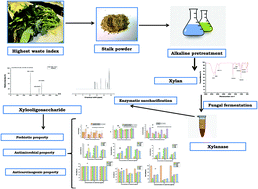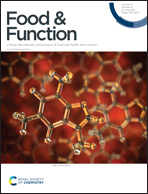Evaluation of nutraceutical application of xylooligosaccharide enzymatically produced from cauliflower stalk for its value addition through a sustainable approach
Abstract
There is increasing attention on the exploration of waste feedstocks as economically viable substrates for the production of prebiotic oligosaccharides, especially xylooligosaccharides, as excellent candidates for the maintenance and promotion of gut microbiota. XOS, an emerging prebiotic that has several functional attributes and beneficial health effects, is mainly produced by different processes, especially enzymatic hydrolysis through the valorisation of xylan enriched lignocellulosic materials. The present study deals with the enzymatic production of xylooligosaccharide (XOS) from xylan rich cauliflower stalk, a novel source. Delignification with alkali (NaOH) was found to be more efficient than acid and autohydrolysis, resulting in a higher extraction yield of xylan (18.42%). Alkaline extraction for 120 minutes at 1.25 M alkali concentration produced maximum xylan yield. FTIR analysis of xylan extracted from cauliflower stalk by an alkaline (NaOH) pretreatment method showed typical absorption bands at 1729 cm−1 that correspond to acetyl groups exhibiting the typical xylan specific band. Enzymatic hydrolysis was carried out with indigenously produced crude endoxylanase obtained from Aspergillus niger MTCC 9687 and the effects of substrate concentration, enzyme concentration, pH, time and temperature were investigated. High resolution MS analysis showed the presence of xylobiose as the major XOS. The major 1H spectral signals of XOS liberated from enzymatically hydrolysed alkali extracted cauliflower stalk xylan showed the presence of β-anomeric protons in the spectral region of 4.0–4.7 ppm. Prebiotic efficacy of cauliflower stalk derived XOS alone and synbiotic combinations with known probiotic strains (Lactiplantibacillus plantarum, Bifidobacterium bifidum, Lactobacillus delbrueckii ssp. Helveticus) were evaluated. Butyrate was found to be the major short chain fatty acid produced by XOS supplemented fermentation media. All the synbiotic combinations showed significantly higher antioxidant and antimicrobial activities and reduced the viability of human bone cancer MG-63 cells. The individual profiles of antimicrobial components of XOS were identified as dihydroxy benzoic acid and aspartic acid by HPLC coupled to a photodiode array detector.



 Please wait while we load your content...
Please wait while we load your content...